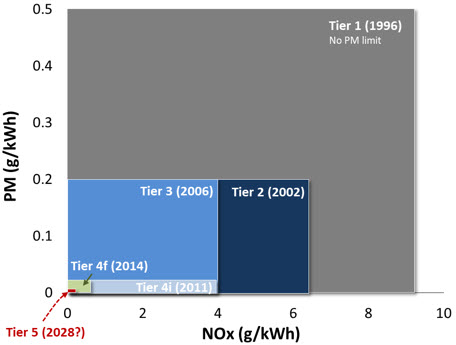CARB Tier 5 Off-road : A summary of elements being considered
What are the changes being considered?
Relative to Tier 4 Final standards:
- Up to 75% reduction in NOx & PM for diesel engines < 56 kW
- 75% or 90% reduction in NOx & PM for diesel engine 56 – 560 kW
- 50% reduction in NOx & PM for diesel engines > 560 kW
Equipment < 19 kW to be zero emission (Small off-road emission – SORE – regulations)
First-ever CO2 tailpipe standard for diesel engines : 5 – 8.6% reduction
New Low Load Application Cycle (LLAC) for certification
Increased useful life from 8000 hrs to 12,000 hrs for 56 – 560 kW engines. Extended warranties tbd.
Idling measures (engine shut-off for prolonged idling)
Manufacturer-run in-use testing program – could be moving average window (MAW) type similar to on-road

Collaboration with EPA is a must
Note that in the non-road sector, California can not set standards for new farm and construction equipment under 175 hp. Further, currently there is no restriction on sale of equipment from other states. Thus CARB will look to EPA to set tighter nationwide standards for maximum impact.
Timing
Timing is unclear at this point, but given that EPA low NOx regulations for on-highway trucks starts in 2027, the non-road regulations should start at least a year or two later. Also, note that the low load application cycle (LLAC) is yet to be fully developed so there is more work ahead.
If you like such content, check out the monthly newsletter covering the latest on sustainable transportation technologies and regulations. Sign up below.
Like it ? Share it !
Other recent posts
How much biofuels can we make, really ?
Lowering the carbon footprint of existing vehicles will require switching to low carbon fuels. The immediate question this raises, is “how much low carbon fuel can we make?” and, “doesn’t using biomass for fuels affect the food production?”
Summary of EV related U.S. Tariffs on Chinese Imports
The Biden Administration has announced significant new tariffs on a range of Chinese-made electric vehicles and related strategic components. Here is a summary.
SAE WCX 2024 – Year in Review
The SAE World Congress was held in Detroit and covered a broad range of topics pertinent to transport decarbonization. Here’s a link to download presentations on emissions and sustainability.
